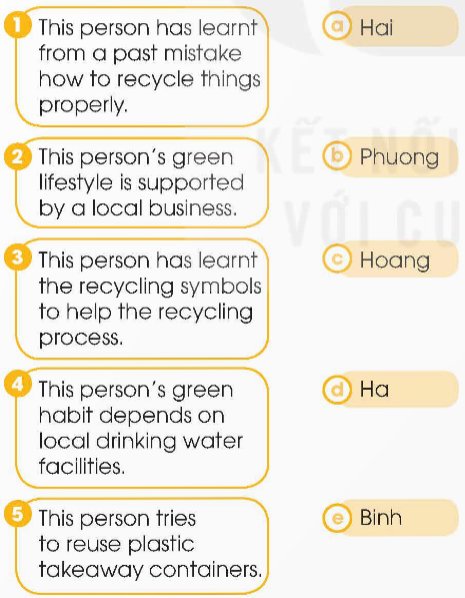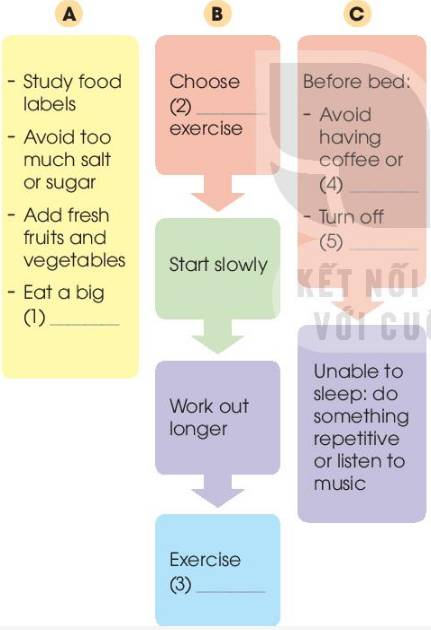Read the email extracts again. Match the following information with the right names.

Read the task below. Does the email cover all four points in the task? Match sentences in the email with each point.
You have recently moved to a new flat in a city centre. Write an email to a friend. Include the following:
• Say why you like your new flat.
• Mention something you would like to be different.
• Mention meeting a new neighbour and describe him/her.
• Ask permission to use something belonging to your friend.
Yes, the email covers all four points in the task.
(Có, email bao gồm tất cả bốn điểm trong nhiệm vụ.)
• Say why you like your new flat. - "It's brilliant being so close to the shops, and the flat is bigger than our old one."
(Nói lý do tại sao bạn thích căn hộ mới của bạn. - "Thật tuyệt khi ở gần các cửa hàng, và căn hộ thì rộng hơn căn hộ cũ của chúng tôi.")
• Mention something you would like to be different. - "It's quite noisy, though, as there is a lot of traffic. I'd rather it was further from the main road."
(Đề cập đến điều gì đó mà bạn muốn nó khác đi. - "Tuy nhiên, nó khá ồn ào vì có nhiều phương tiện giao thông. Tôi muốn nó ở xa đường chính hơn.")
• Mention meeting a new neighbour and describe him/her. - "I met one of our neighbours yesterday. She is about my age, and she is very friendly."
(Đề cập đến việc gặp một người hàng xóm mới và mô tả anh ấy/cô ấy. - "Tôi đã gặp một người hàng xóm của chúng tôi ngày hôm qua. Cô ấy trạc tuổi tôi, và cô ấy rất thân thiện.")
• Ask permission to use something belonging to your friend. - "Also, would it be OK if I used your bike for a few days? Mine is at the bike shop and I'd rather cycle to school than get the bus."
(Xin phép sử dụng thứ gì đó thuộc về bạn của bạn. - "Còn nữa, tôi có thể sử dụng xe đạp của bạn trong vài ngày không? Xe của tôi ở cửa hàng xe đạp và tôi thà đạp xe đến trường hơn là bắt xe buýt.")
Read the Recycle! box. Complete the extracts from the dialogues with the verbs in brackets. Use the present perfect or past simple. Listen again and check your answers.
Dialogue 1
a My ankle really hurts. I think I__________ (twist) it.
b Yes, it's a bit swollen. You__________(sprain) it.
Dialogue 2
c I __________ (have) an accident. I__________ (bang) my head.
d I__________ (trip) over the cat and__________ (hit) my head on the corner of a table.
Dialogue 3
e I__________ (hurt) my thumb. I __________ (trap) it in the car door.
f You __________ certainly __________ (bruise) it.
g It's really painful. Do you think I __________ (break) it?
a. 've twisted
b. 've sprained
c. 've had; banged
d. tripped; hit
e. 've hurt; trapped
f. 've bruised
g. 've broken
Read the article again. Match the following headings (1-4) with the appropriate paragraphs (A-C). There is ONE extra heading.
1. Organising photo competitions of performing artists
2. Promoting and developing the folk arts
3. Making use of social media to promote heritage
4. Opportunities to learn about heritage and be involved in problem-solving
Paragraph A - 3. Making use of social media to promote heritage
(Đoạn A - Tận dụng mạng xã hội để quảng bá di sản)
Paragraph B - 4. Opportunities to learn about heritage and be involved in problem-solving
(Đoạn B - Cơ hội tìm hiểu về di sản và tham gia giải quyết vấn đề)
Paragraph C - 2. Promoting and developing the folk arts
(Đoạn C - Phát huy và phát triển nghệ thuật dân gian)
Read the article again. Which paragraph contains the following information? Write A, B, or C.
1. The definition of ‘peer pressure’
2. How peer pressure Can cause social issues
3. Dealing with peer pressure
4. The possible problems facing teens if they do not follow their peers
Read the article. Match the highlighted words with their meanings.
Over the past two centuries, different generations were born and given different names. Each generation comes with its characteristics, which are largely influenced by the historical, economic, and social conditions of the country they live in. However, in many countries the following three generations have common characteristics.
Generation X refers to the generation born between 1965 and 1980. When Gen Xers grew up, they experienced many social changes and developments in history. As a result, they are always ready for changes and prepared to work through changes. Gen Xers are also known as critical thinkers because they achieved higher levels of education than previous generations.
Generation Y, also known as Millennials, refers to those born between the early 1980s and late 1990s. They are curious and ready to accept changes. If there is a faster, better way of doing something, Millennials want to try it out. They also value teamwork. When working in a team, Millennials welcome different points of view and ideas from others.
Generation Z includes people born between the late 1990s and early 2010s, a time of great technological developments and changes. That is why Gen Zers are also called digital natives. They grew up online and never knew the world before digital and social media. They are very creative and able to experiment with platforms to suit their needs. Many Gen Zers are also interested in starting their own businesses and companies. They saw so many people lose their jobs, so they think it is safer to be your own boss than relying on someone else to hire you.
Soon a new generation, labelled Gen Alpha, will be on the scene. Let's wait and see if we will notice the generation gap
1. experienced | a. to try or test new ideas or methods |
2. curious | b. went through |
3. digital natives | c. to employ |
4. experiment | d. wanting to know about something |
5. hire | e. people born in the era of technology |
Read the article again. Complete the diagrams with information from the text. Use no more than TWO words for each gap.

1 - breakfast
2 - suitable
3 - regularly
4 - energy drinks/exercising
5 - electronic devices
1. breakfast
2. suitable
3. regularly
4. energy drinks
5. electronic devices
Read the text again. Complete the diagrams with information from the text. Use no more than TWO words for each gap.

(1): solutions
(2): best option
(3): to-do lists
(4): night's sleep
Read the following information about Hopeans. Listen again and fill in each blank with ONE word or number that you hear.
| Name | Hopeans |
| Living place | Planet Hope in the Milky Way Galaxy |
| Appearance | - have a big head, (1) _____ eyes, two legs, and (2) ______ arms - have thick skin to protect them from the heat |
| Behaviour | - friendly and (3) _____ - only (4) _____ to people who try to attack them |
| Lifestyle | - eat special (5) _____ and drink petrol from under the ground - travel by (6) ______ at very high speeds |
1. 4 (four)
2. 4 (four)
3. hospitable
4. dangerous
5. plants
6. rockets
Bài nghe:
Good morning, everyone. Today I'd like to tell you about life on a planet called Planet Hope.
Planet Hope is in the Milky Way Galaxy. It is three times bigger than Earth. It has three suns and four moons, so the weather is hot all year round, and its surface is quite dry. Planet Hope has only one season.
The creatures living there are Hopeans, and they don't look like us. They have a big head, four eyes, two legs, and four arms. They have thick skin to protect them from the heat. They are very friendly and hospitable. They are only dangerous to people who try to attack them.
Hopeans grow special plants for food. They don't drink liquid water, they drink a type of petrol from under the ground. Hopeans use rockets to travel at very high speeds.
That is my description of Planet Hope and the creatures living on it. I hope you enjoyed it and thank you for listening.
Tạm dịch:
Chào buổi sáng mọi người. Hôm nay tôi muốn kể cho các bạn nghe về sự sống trên một hành tinh tên là Hành tinh Hy vọng.
Hành tinh Hy vọng nằm trong Dải Ngân hà. Nó lớn gấp ba lần Trái đất. Nó có ba mặt trời và bốn mặt trăng nên thời tiết ở đây nóng quanh năm và bề mặt của nó khá khô. Hành tinh Hy vọng chỉ có một mùa.
Những sinh vật sống ở đó là nhưng Hopeans, và họ không giống chúng ta. Họ có đầu to, bốn mắt, hai chân và bốn tay. Họ cò có lớp da dày để bảo vệ họ khỏi cái nóng. Họ rất thân thiện và hiếu khách. Họ chỉ nguy hiểm với những người cố gắng tấn công hộ.
Hopeans trồng các loại cây đặc biệt để làm thức ăn. Họ không uống nước lỏng, họ uống một loại dầu từ dưới lòng đất. Hopeans sử dụng tên lửa để di chuyển với tốc độ rất cao.
Đó là mô tả của tôi về Hành tinh Hy vọng và những sinh vật sống trên đó. Tôi hy vọng mọi người thích nó và cảm ơn các bạn đã lắng nghe.
Read the article again and complete the diagram with information from the text. Use no more than TWO words for each answer.

1. support
2. operate
3. green space
4. transport systems
cho mình biết vì sao lại chọn đáp án ấy nha
8. match the places of ( interesting) in viet nam with the names given below
9. you should make ( suggest ) about which places to visit
10 the jones family are going around ha noi and they're talking about the ( direct) to 5 places in the map
interest (places of interest: nơi được quan tâm)
suggestion (make suggestion: đưa ra gợi ý)
direction (sau the dùng danh từ thôi)